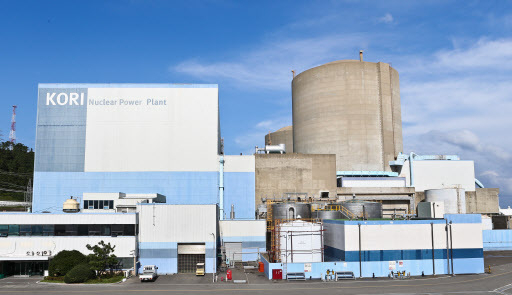 |
Kori 1 nuclear reactor in Busan (Korea Hydro & Nuclear Power) |
South Korea’s Ministry of Energy said on Monday it would establish the nation’s first research institute dedicated to dismantling nuclear power plants, for the safe disposal of nuclear power plants whose operations have been permanently suspended.
In a groundbreaking ceremony held in Ulju-gun, located on the border between the southeastern port cities Busan and Ulsan, the Ministry of Trade, Industry and Energy said that construction of the institute is expected to be completed by the second half of 2026.
The institute will also function as a comprehensive platform to aid industries using nuclear power plant dismantling technology, such as companies dedicated to analyzing radioactive waste, according to the Ministry of Energy.
A total of 313 billion won ($220 million) -- including 87.4 billion won from the Ministry of Industry, 193.4 billion won from public institutions such as Korea Hydro & Nuclear Power and 32.2 billion won from Busan, Ulsan, Gyeongju and North Gyeongsang Province -- has been contributed for investments toward the establishment of a research institute. The government added it plans to secure additional funds if necessary.
The ministry is also scheduled to start on the construction of a Gyeongju institute dedicated to dismantling heavy water reactors, including the Wolsung 1, 2, 3 and 4, next year.
Korea Hydro & Nuclear Power, Doosan Enerbility and the Korea Atomic Industrial Forum attended the conference for nuclear dismantling industries, held on the same day, to discuss ways to strengthen the competitiveness of the nuclear power plant dismantling industries.
"We expect the research institute to be the foundation upon which safe nuclear plant dismantling technologies can be developed, to dismantle nuclear power plants such as Kori 1. We will do our best to secure work and develop technologies related to the dismantling of nuclear power plants,” said Deputy Energy Ministry Cheon Young-gil.
In 2017, the government shut down the country's oldest reactor, the Kori 1, in Busan, 39 years after its opening, in regard to the 2011 Fukushima nuclear disaster and corruption in the nuclear power plants. The Wolsong 1 reactor closed the following year.







![[Today’s K-pop] Blackpink’s Jennie, Lisa invited to Coachella as solo acts](http://res.heraldm.com/phpwas/restmb_idxmake.php?idx=644&simg=/content/image/2024/11/21/20241121050099_0.jpg)